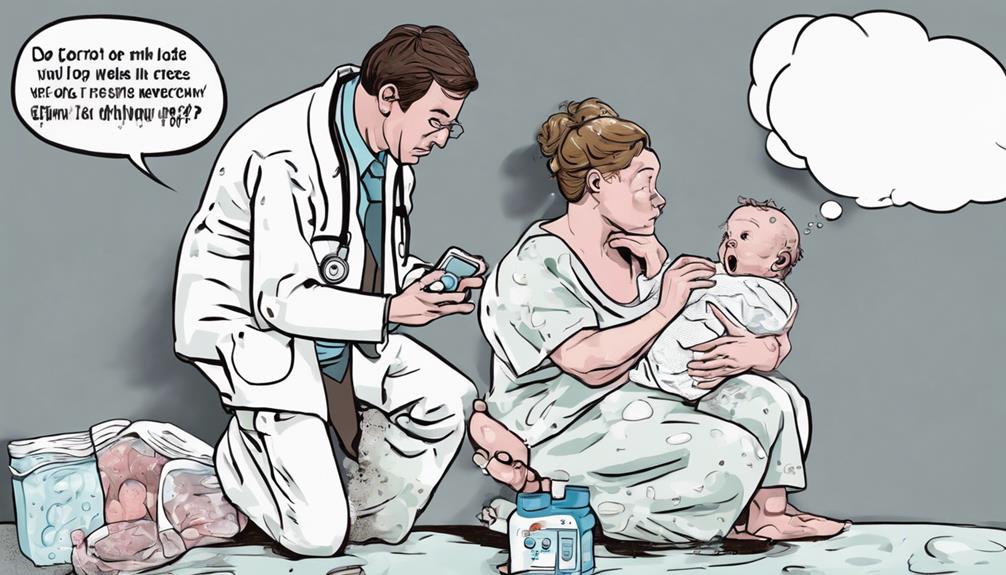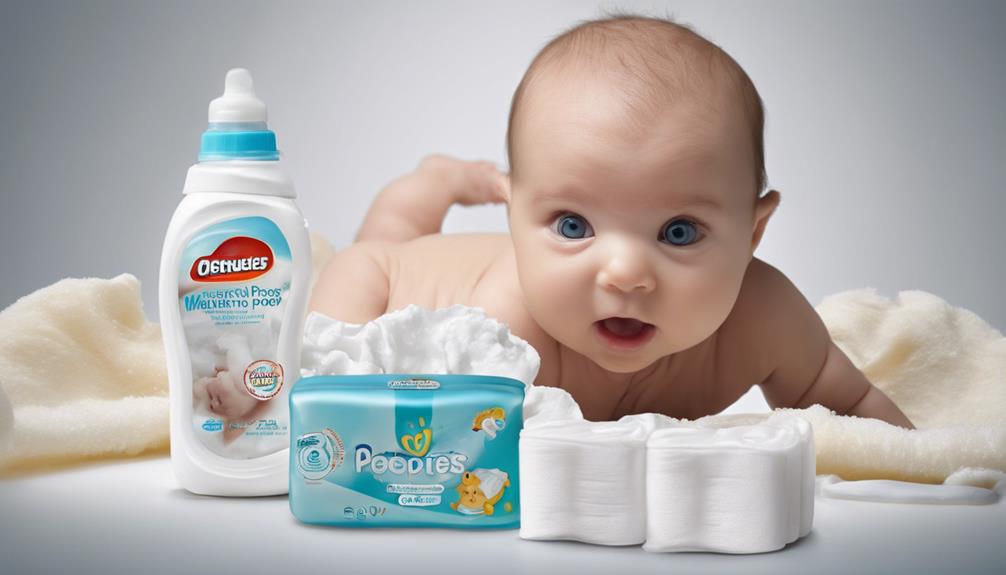When it comes to examining newborn poop, we may encounter a peculiar yet intriguing phenomenon – the presence of bubbles.
While this may seem like a minor detail in the grand scheme of baby care, understanding the significance behind these bubbles can shed light on your infant's health.
So, what exactly do these bubbles in your baby's stool signify, and how should you address them?
Let's unravel the mystery together and explore the essential steps to decode and manage bubbles in newborn poop.
Key Takeaways
- Monitor stool for air bubbles, color changes, and texture variations.
- Address bubble causes like air ingestion and digestive immaturity promptly.
- Seek guidance from healthcare providers or lactation consultants for evaluation.
- Implement feeding techniques to prevent bubble formation in newborn stool.
Common Causes of Bubbles in Newborn Poop
When observing bubbles in newborn poop, it's essential to understand the common causes behind this occurrence to discern any potential underlying issues. Babies can develop foamy stools with bubbles for several reasons. One common cause is a foremilk-hindmilk imbalance in breastfeeding, where the baby may be receiving more of the watery foremilk and not enough of the fatty hindmilk. This imbalance can lead to increased gas production and foamy bowel movements.
Additionally, an immature digestive system in newborns can contribute to the presence of bubbles in their stool. Their digestive systems are still developing, making it harder for them to break down certain components of breast milk or formula, leading to excess gas and mucus in the stool.
Sometimes, bubbles in newborn poop can be a result of the baby swallowing air during feeding. This can happen if they're latched improperly or if they're feeding too quickly. Consulting a healthcare provider can help determine the exact cause of bubbles in the baby's stool and provide guidance on how to address any underlying issues effectively.
Recognizing Bubbles in Baby Stool
Bubbles found in a baby's stool can often be attributed to the ingestion of air during feeding, which is a common occurrence and typically poses no significant health concerns. When examining baby stool for bubbles, it's important to take into account the following:
- Color and Texture: Changes in poop color and consistency are normal in newborns. Breastfed baby stools can vary from pasty to watery, and these variations are usually not a cause for alarm.
- Presence of Air Bubbles: The presence of air bubbles alone doesn't necessarily indicate a problem with the baby's digestive health. It's common for babies to swallow air during feedings, leading to the appearance of bubbles in their stool.
- Observing Changes: Keep an eye on any changes in the baby's stool over time. If there are consistent issues such as persistent watery stools or significant changes in color accompanied by other concerning symptoms, it's advisable to consult a healthcare provider for further evaluation.
Tips for Addressing Bubbles in Poop
Addressing the presence of bubbles in a baby's stool involves implementing strategies to minimize air ingestion during feedings and monitoring any changes in stool characteristics. Proper positioning during breastfeeding plays an important role in reducing the likelihood of bubbles in a baby's poop. Ensuring that the baby is latched on correctly can help prevent excess air from being swallowed.
A health visitor or lactation consultant can provide guidance on achieving a proper latch and positioning for successful breastfeeding. Healthy breastfed babies may have frothy stools occasionally, especially if they feed vigorously or rapidly. If the baby experiences explosive poos or consistently passes foamy stools with mucus, it could indicate a sensitivity to something in the mother's diet.
It's essential to observe the baby's overall health and well-being in addition to monitoring their poop. Consulting a healthcare provider can offer reassurance and advice on managing any concerns regarding bubbles in the baby's stool.
Seeking Medical Advice for Bubble Concerns

To guarantee the well-being of your baby, seeking medical advice for concerns related to bubbles in their poop is essential. When it comes to addressing bubble issues in newborn stool, here are some important points to think about:
- Consulting Healthcare Providers: Reach out to medical professionals such as pediatricians or lactation consultants for expert advice on bubble concerns in your baby's poop. These professionals can offer valuable insights into potential causes and solutions.
- Ensuring Prompt Attention: Seeking medical advice promptly for bubble-related worries is important to address any underlying issues swiftly. This proactive approach can help maintain your baby's digestion and nutrition in the best condition.
- Monitoring Overall Well-being: Keeping a close eye on your baby's overall health and development while dealing with bubble concerns is essential for their well-being. By staying in touch with healthcare providers, you can make sure that any issues are addressed promptly and effectively.
Preventing Bubble Formation in Newborn Stool
Proper breastfeeding techniques play an important role in minimizing air intake and consequently reducing the likelihood of bubble formation in newborn stool. Ensuring a proper latch during breastfeeding is essential for a baby's health and can greatly impact their digestive system, helping to prevent bubbles in stool.
Additionally, burping your baby frequently, both during and after feeds, can minimize air swallowing, which is a common cause of bubbles in stool. For formula-fed babies, employing paced bottle feeding techniques can control milk flow, reducing air ingestion and the formation of bubbles in stool.
Keeping your baby upright during and after feeding aids in burping, preventing air from getting trapped in the digestive system and leading to bubble formation. Furthermore, avoiding overfeeding and allowing breaks during feeding sessions can help prevent excessive air intake, further reducing the likelihood of bubbles in your baby's stool.
Frequently Asked Questions
Why Does My Newborns Poop Have Bubbles?
We see bubbles in newborn poop due to air swallowed during feeding. It's typically harmless and doesn't signal a problem. As long as baby's growing well, these bubbles are usually nothing to worry about.
Why Does My Poop Look Like It Has Air Bubbles?
We've noticed air bubbles in our poop. It can happen when we swallow air while eating. Usually harmless, just a quirk of digestion. If other symptoms arise, like persistent fussiness, it's wise to seek medical advice.
What Does Frothy Baby Poop Look Like?
Frothy baby poop, often seen in breastfed infants, appears with tiny bubbles. The presence of bubbles in baby stool can indicate air swallowed during feeding. It's usually normal and not a cause for concern.
What Does Foamy Poop Mean?
Foamy poop in babies can be caused by air bubbles in their stools during digestion. It's common in breastfed infants and often not a serious issue. If it persists or comes with other symptoms, consult a healthcare provider.
Conclusion
To sum up, bubbles in newborn poop may seem alarming, but they're typically harmless and common in breastfed babies.
By monitoring your baby's poop and seeking guidance from healthcare providers, you can address any concerns and guarantee their digestive health is on track.
Remember, a few bubbles in poop are no cause for panic – trust the experts and focus on providing the best care for your little one.









